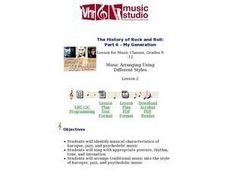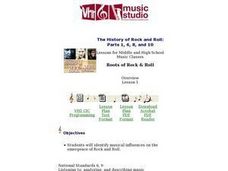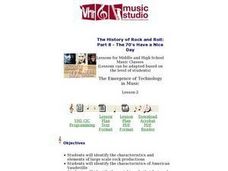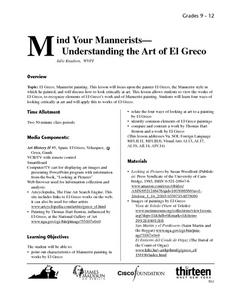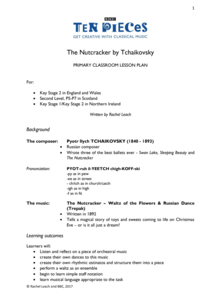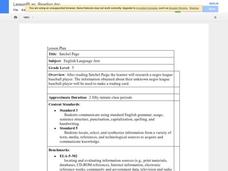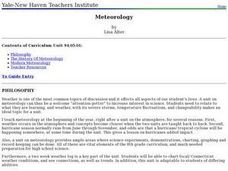Curated OER
You Are There: Television News Reports on Apartheid
Students, in groups, research apartheid and its effects on South Africa. They present their information to the class.
Curated OER
The History of Rock and Roll: Part 1 - Rock and Roll Explodes Music Reflects The Times
Students examine technological advancements in music and broadcast over the decades.
Curated OER
The History of Rock and Roll: Part 6 - My Generation - Lesson 2
Young scholars identify musical characteristics of baroque, jazz, and psychedelic music. They arrange traditional music into the style of baroque, jazz, and psychedelic music.
Curated OER
The History of Rock and Roll: Parts 1, 6, 8, and 10 Roots of Rock & Roll
Learners examine the musical influences on the emergence of Rock and Roll.
Curated OER
The History of Rock and Roll: Part 6 - My Generation Social an Cultural Influence on Music Composition
Students examine influences on the creation and development of music.
Curated OER
The History of Rock and Roll: Part 8 - The 70's - Have a Nice Day - Lesson 1
Students discuss the technological advancements in music that emerged during the 1970's and how they were used. They see how technology in music influenced the artists and their music.
Curated OER
The History of Rock and Roll: Part 8 - The 70's Have a Nice Day - Lesson 2
Students identify the characteristics and elements of large scale rock productions. They examine the similarities between the American Vaudeville shows and the large-scale rock theater productions of the 1970's.
Curated OER
Born on a Mountaintop? Davy Crockett, Tall Tales, and History
Students name tall tale characters and locations, which are based on actual people and places, and describe how they are used in an exaggerated way. They name characters and events from tall tales, then list literary characteristics of...
Curated OER
Mind Your Mannerists-Understanding the Art of El Greco
Kids become mini-experts on the Mannerist movement and the art of El Greco. They identify common elements of El Greco paintings and compare them to a work by Thomas Hart Benton. They use four ways to examine art taken from the book,...
Hawaiʻi State Department of Education
Comparing Cultural Dances
All cultures express similar thoughts, feelings, and ideas. But, often times those things are expressed differently. Learners compare and contrast traditional dances from two cultures. They watch videos of each performance, stop to...
Curated OER
The Cell Phone Age
What kid isn't interested in Cell phones? They are technical and to operate them you must read an informational text. Older elementary learners read an informational text, match vocabulary words with their meanings, and create sentences...
Curated OER
Imagining China through Words
When Europeans first came back with tales of China, they provided vivid written accounts and minimal visual imput. This resulted in art rendered mostly from descriptive language. Learners explore this phenomena by listening to...
Curated OER
Gustar and Similar Verbs
Do you like history? Tamales? Watching the television? Practice using the verb gustar and identify the things you like and the things that don't interest you. Then ask your friends if the topic interests or bores them.
BBC
The Nutcracker by Tchaikovsky
Over the course of six lessons, scholars try their hand at composing and dancing after a thorough examination of the famous ballet, The Nutcracker, by Tchaikovsky. Participants watch and discuss the performance of two dances, create and...
Smithsonian Institution
Students’ Response to 9/11—A Documentary Report
Young historians research the devastating attacks of 9/11 and use that information to script their own documentaries. The follow-up activity includes recording the documentary and conducting classmate interviews,
Curated OER
The Young Basketball Player
Students explore the history of basketball by reading and listening to a book entitled, "The Young Basketball Player." Afterwards, they create a trivia basketball game and write an interview for their favorite player. As a...
Curated OER
An English-Speaking World
An overview of the development of English as a global language fills out these slides. Beginning with statistics regarding how much of the world speaks English and to what capacity, a brief history is then given mostly pertaining to WWII...
Curated OER
Reporting on the 1920s
Use this roaring 1920s history lesson to have young writers research primary and secondary sources. They use their research to examine the events or famous public figures of the time period. Next, they imagine they're in the 1920s and...
Curated OER
Satchel Page
Bring a instructional activity about Negro League Baseball to your Black history unit, or any other research unit throughout the year. While the lesson plan itself is simplistic, there are several good ideas that you could use, such as...
Curated OER
Meteorology
Students research and produce an oral history that reflects the importance of meterologists in the lives of people in their community.
Curated OER
Creating and Using a Checklist of Performance Techniques to Critique and Find the "Message" in Mass Media Performances
Students analyze and critique theater events by evaluating and constructing meanings from improvised and scripted scenes and from theater, film, television, and electronic media productions.
Curated OER
Allusions to Shakespeare in Popular Culture
Send your high schoolers on a scavenger hunt through popular culture (music, television, video games, movies) to find allusions to Shakespeare. They must each provide three to share with the class, and the one they present cannot have...
Curated OER
Learning Landscapes
Fifth graders analyze a landscape depicting Yosemite during the time of the Wild West. They compare their perceptions of the West from film and television to this representation. They observe the use of scale and color to depict size and...
Curated OER
Periodic Webquest
Sixth graders explore the periodic table of elements. Using given websites, 6th graders explore the history of the periodic table and its design. Students role play, writing a journal entry, as if they were the author of the periodic table.




